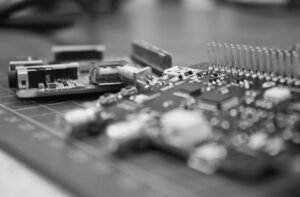**Introduction**
AI (Artificial Intelligence) has revolutionized the software testing industry, making it more efficient and effective. With the help of AI-powered software testing tools, organizations can automate repetitive tasks, improve test coverage, and identify defects early in the development lifecycle. This article explores the benefits of using AI in software testing tools and how it is changing the landscape of software testing.
**Key Takeaways**
– AI-powered software testing tools automate repetitive tasks and improve test coverage.
– AI helps identify defects early in the development lifecycle.
– AI in software testing tools improves efficiency and reduces the time and cost of testing.
**The Role of AI in Software Testing**
AI has enabled software testing tools to become more sophisticated and intelligent. These tools can now automatically generate test cases, analyze test results, and even predict the occurrence of defects based on historical data. By leveraging AI and machine learning algorithms, software testing tools can learn from previous test runs and continuously improve their testing strategies.
*AI-powered software testing tools can automatically generate test cases based on the application’s requirements and specifications, saving time and effort for testers.*
**Benefits of AI in Software Testing**
The integration of AI in software testing tools brings numerous benefits to organizations. Here are some of the key advantages:
1. **Improved Test Coverage:** AI-powered testing tools can analyze huge amounts of data and test a variety of scenarios more comprehensively, leading to better test coverage and increased confidence in software quality.
2. **Early Defect Detection:** AI algorithms can analyze test results and identify patterns indicative of defects, enabling testers to identify issues early in the development cycle and address them promptly.
3. **Reduced Testing Effort and Cost:** AI-based tools can automate repetitive tasks, allowing testers to focus on more critical aspects of testing. This automation reduces testing effort and associated costs, leading to overall cost savings.
*By leveraging AI algorithms, software testing tools can intelligently prioritize test cases based on their likelihood to uncover defects, optimizing testing efforts.*
**AI and Test Data Management**
Test data management is a critical component of software testing. AI-powered tools can assist in generating relevant test data, ensuring that all possible scenarios are covered. These tools can analyze the application under test, understand its data requirements, and generate synthetic data that represents real-world scenarios.
*AI algorithms can generate realistic synthetic data for testing, reducing reliance on manual data generation and promoting data-driven testing approaches.*
**AI vs. Traditional Testing Approaches**
Comparing AI-powered testing tools with traditional testing approaches highlights the significant advantages of AI-driven testing:
– **Speed**: AI-powered tools can execute tests faster compared to manual testing or traditional automation approaches.
– **Adaptability**: AI algorithms can adapt to changes in the application under test, making them effective even in dynamic environments.
– **Intelligence**: AI-driven tools can analyze test results intelligently, identifying patterns and correlating data to uncover defects.
– **Efficiency**: AI-powered testing tools can prioritize tests and allocate resources more effectively, reducing time and effort.
*AI-powered testing tools offer greater speed, adaptability, and intelligence compared to traditional testing approaches.*
**Tables**
Table 1: Comparison of Time Taken for Test Execution
| Testing Approach | Time Taken for Test Execution |
|————————|——————————-|
| Traditional | Longer |
| AI-powered | Significantly Reduced |
Table 2: Comparison of Test Coverage
| Testing Approach | Test Coverage |
|————————|—————————————-|
| Traditional | Limited |
| AI-powered | Comprehensive |
Table 3: Comparison of Defect Detection Capability
| Testing Approach | Defect Detection Capability |
|————————|——————————-|
| Traditional | Manual analysis |
| AI-powered | Intelligent test result analysis |
**Conclusion**
The integration of AI in software testing tools has revolutionized the testing industry, providing organizations with faster, more intelligent, and efficient testing capabilities. AI-powered tools enable improved test coverage, early defect detection, and reduced testing effort and cost. With the ability to automatically generate test cases, analyze test results, and generate synthetic test data, AI is transforming the way software testing is conducted. Embracing AI in software testing tools is crucial for organizations seeking to stay ahead in today’s fast-paced digital world.

Common Misconceptions
Misconception: AI in Software Testing Tools can completely replace human testers
Many people believe that AI-powered testing tools are capable of completely replacing human testers. However, this is not the case. While AI can automate certain aspects of testing, human testers are essential for complex scenarios that require critical thinking, creativity, and domain knowledge.
- AI cannot mimic the intuition and experience of skilled human testers.
- Human testers provide insights and judgment that AI cannot offer.
- AI may miss certain test scenarios that require human cognitive abilities.
Misconception: AI in Software Testing Tools is error-free
Another common misconception is that AI-powered testing tools are error-free. While AI can significantly enhance test automation, it is not immune to errors or bugs. Just like any other software, AI algorithms used in testing tools can have limitations and may produce incorrect results under certain circumstances.
- AI algorithms require careful development, validation, and tuning.
- Testing tools using AI should be subjected to rigorous testing.
- The quality of AI-powered testing tools depends on the quality of training data.
Misconception: AI in Software Testing Tools eliminates the need for test case design
Some people believe that AI-powered testing tools can automatically generate test cases without any human intervention. However, test case design still remains a crucial step in software testing. While AI can assist in generating test cases, human testers need to provide guidance and expertise to ensure appropriate coverage, risk analysis, and validation.
- Test case design involves understanding the software requirements and user personas.
- Human testers can add domain-specific knowledge to test case design.
- AI-generated test cases need thoughtful analysis and refinement by human testers.
Misconception: AI in Software Testing Tools is a one-size-fits-all solution
Some people mistakenly assume that AI-powered testing tools can be used universally for all types of software applications and testing scenarios. However, the effectiveness of AI in testing depends on various factors, such as the type of application, the complexity of the system, and the goals of testing.
- AI may not be suitable for testing applications with dynamic or rapidly changing interfaces.
- The applicability of AI in testing depends on the availability and quality of training data.
- The effectiveness of AI tools varies based on the technology stack and architecture of the application.
Misconception: AI in Software Testing Tools can automatically identify all types of defects
It is misleading to believe that AI-powered testing tools can automatically identify all types of defects in software applications. While AI can help detect certain types of defects, such as anomalies or patterns that match known issues, it cannot detect conceptual flaws or issues that require human intelligence and reasoning.
- AI may struggle to identify defects that deviate from known patterns or valid user interactions.
- AI cannot replace the analytical skills and creativity of human testers in defect identification.
- Human testers play a crucial role in capturing edge cases and uncovering hidden defects.

Introduction
Artificial Intelligence (AI) is revolutionizing the world of software testing. With the ability to automate repetitive tasks, analyze large datasets, and simulate complex scenarios, AI-powered testing tools are becoming increasingly popular in the industry. This article explores ten remarkable examples of AI in software testing tools, showcasing their capabilities and the benefits they bring to the testing process.
Table: AI-Powered Test Case Generation Tools
Test case generation is a crucial part of software testing. AI-powered tools automate this process based on system specifications, generating comprehensive test cases that cover a wide range of scenarios, reducing manual effort and time spent.
Table: AI-Based Bug Detection Tools
Identifying and reporting bugs is a challenging task. AI-based bug detection tools use machine learning algorithms to analyze code and flag potential issues automatically. This speeds up the bug detection process, allowing developers to resolve them quickly.
Table: AI-Driven Test Execution Tools
Test execution involves running test cases and comparing the actual results with the expected outcomes. AI-driven test execution tools leverage intelligent algorithms to execute tests efficiently, collect data, and provide insights on system behavior.
Table: AI-Enhanced Test Data Management Tools
Test data management involves creating, maintaining, and securing test datasets. AI-enhanced test data management tools automate the generation of synthetic datasets, eliminating the need for manual data creation and ensuring better data coverage.
Table: AI-Integrated Performance Testing Tools
Performance testing evaluates system behavior under varying workloads. AI-integrated performance testing tools use machine learning to analyze performance data, predict potential bottlenecks, and suggest optimizations to enhance system scalability.
Table: AI-Powered Usability Testing Tools
Usability testing assesses the ease of use and user experience of software applications. AI-powered usability testing tools leverage natural language processing and sentiment analysis to gather user feedback, identify pain points, and recommend improvements.
Table: AI-Based Test Coverage Analysis Tools
Test coverage analysis measures the extent to which a software application has been tested. AI-based test coverage analysis tools use algorithms to analyze code paths and identify untested areas, assisting in the creation of comprehensive test suites.
Table: AI-Enabled Regression Testing Tools
Regression testing ensures that changes or updates to software do not introduce new bugs or break existing features. AI-enabled regression testing tools use machine learning to prioritize test cases, focusing on areas more likely to be affected by changes.
Table: AI-Augmented Test Report Generation Tools
Test reporting summarizes test results, defects, and system behavior. AI-augmented test report generation tools automate this process, extracting relevant information from test data and generating comprehensive reports with visualizations.
Table: AI-Supported Test Environment Management Tools
Test environment management involves setting up and maintaining the required infrastructure for testing. AI-supported test environment management tools automate the provisioning of test environments, reducing setup time and resource overhead.
Conclusion
AI has significantly transformed the landscape of software testing tools. With its ability to automate processes, analyze data, and enhance decision-making, AI empowers testers and developers to deliver higher-quality software in less time. From test case generation to bug detection, performance testing to usability analysis, the integration of AI in software testing tools amplifies efficiency, accuracy, and effectiveness. As technology progresses, we can expect even more innovative AI-driven solutions that further enhance the testing process, making it an exciting time for software testers and organizations.
AI in Software Testing Tools – Frequently Asked Questions
Question: What is AI in software testing?
AI in software testing refers to the application of artificial intelligence techniques and technologies in the process of testing software applications. It involves using machine learning algorithms, natural language processing, and other AI methodologies to automate testing tasks, improve testing accuracy, and increase testing efficiency.
Question: How does AI help in software testing?
AI in software testing provides several benefits. It helps in automating repetitive testing tasks, reducing human errors, increasing test coverage, and improving testing accuracy. AI algorithms can analyze large datasets to identify patterns and anomalies that might be missed by human testers. Additionally, AI can simulate user behaviors and generate realistic test scenarios, leading to better testing outcomes.
Question: What are the major AI techniques used in software testing?
Some of the major AI techniques used in software testing include machine learning, natural language processing, image recognition, anomaly detection, and predictive analytics. These techniques enable software testing tools to learn from data, understand natural language inputs, analyze visual elements, detect unusual behavior, and predict future defects or issues.
Question: Can AI completely replace human testers in software testing?
No, AI cannot completely replace human testers in software testing. While AI can automate various testing tasks and help detect certain types of defects, human testers still play a critical role in areas that require human decision-making, creative thinking, and domain expertise. Human testers are essential for exploring edge cases, validating user experience, and ensuring overall quality.
Question: Are there any risks or limitations associated with AI in software testing?
Yes, there are risks and limitations associated with AI in software testing. One of the risks is relying too heavily on AI without considering its limitations, which can result in false positives or false negatives. AI models also need to be continuously updated and trained on new data to adapt to changes in the software being tested. Additionally, AI models may have biases that can impact the accuracy of testing results.
Question: How can AI be integrated into existing software testing practices?
AI can be integrated into existing software testing practices by using AI-powered testing tools or platforms. These tools can be integrated with test management systems and test automation frameworks to enhance their capabilities. Test data can be fed into AI models to train them for specific testing tasks, and AI-based test generation techniques can assist in generating comprehensive and realistic test cases.
Question: What types of software testing tasks can be automated using AI?
Several types of software testing tasks can be automated using AI, including test case generation, test data generation, test script generation, test execution, test result analysis, and defect identification. AI can also help in automated regression testing, performance testing, security testing, and usability testing. By automating these tasks, AI can significantly reduce human effort and accelerate the testing process.
Question: How can AI improve the accuracy of software testing?
AI can improve the accuracy of software testing by analyzing large amounts of data and identifying patterns or anomalies that might be missed by human testers. AI algorithms can also learn from previous testing experiences to optimize test case selection, prioritize test execution, and detect potential defects or vulnerabilities. By leveraging AI, software testing can become more precise, efficient, and effective.
Question: Are there any open-source AI tools available for software testing?
Yes, there are open-source AI tools available for software testing. Some popular open-source AI testing tools include TensorFlow, Keras, scikit-learn, and Apache OpenNLP. These tools provide machine learning and natural language processing capabilities that can be utilized in software testing. Additionally, there are open-source AI-driven test automation frameworks like Selenium WebDriver that integrate AI functionalities.
Question: What are the key considerations when adopting AI in software testing?
When adopting AI in software testing, key considerations include selecting the right AI tools or platforms, ensuring data quality and relevance, addressing bias and fairness issues, investing in AI training and skill development, and creating a balance between AI automation and human expertise. Organizations should also evaluate the cost-effectiveness and scalability of AI implementations and regularly monitor the performance and accuracy of AI models.





